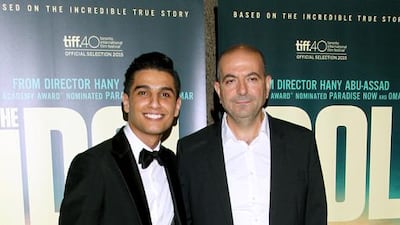The world premiere of The Idol at the Toronto film festival was lauded by audiences and critics alike on Sunday.
Perhaps more importantly, film buyers seem to be as happy as the audiences, with strong sales in a number of key territories suggesting that the movie – based on the incredible life story of Mohammed Assaf, the young Palestinian wedding singer who beat the odds to win Arab Idol in 2013 and has become a global superstar – could become the most successful Arab film to date.
Assaf attended the premiere of the film, along with director Hany Abu-Assad, Qais Atallah, the child actor who plays Mohammed Assaf in the first part of the film, and Ahmad Qassim and Abdelkarim Abu Baraka, who play his childhood friends.
Speaking to The National the day after the triumphant debut, Abu-Assad, the director of Oscar-nominated thrillers Omar (2013) and Paradise Now (2005) said that he was overwhelmed by the reception, the best he has received for any of his films at the festival.
“Listen, this is my third time in Toronto and because of that, when I come, I know what to expect and it seems so familiar – and yet, the audience can still be surprising,” he says.
In telling Assaf’s story, the director admits to have taken some creative liberties, saying that he had to adapt some of the facts and people involved in the story to give the film it’s pulsating narrative arc.
“The character of Omar [one of Assaf’s childhood friends] is completely fictional– it’s based on a true story but it’s fictionalised,” he says. “Another example is that in reality, Assaf has six brothers and sisters but I concentrated on the relationship with one sister because it’s more dramatic.”
As I was chatting to Abu-Assad, his wife and producer whispered into his ear. It brought a huge smile to the director’s face – news was being relayed about the positive reviews of the film that were being published.
Trade magazine Screen International said: "In its broad strokes, The Idol may seem like a very familiar a-star-is-born tale, but at just about every turn Abu-Assad transcends that simplicity for a more moving, complex examination of what Assaf had to go through to even enter the competition". Industry journal Variety called the film a "thoroughly captivating tale".
Abu-Assad explains that he doesn’t read reviews, he prefers to be told whether they are good or bad.
So much for the critical reaction to the film – what about the man who inspired it all? What does he think of it?
An exuberant Assaf says that initially he was worried that the actors wouldn’t be able to capture his presence on screen but adds: “It was a very great thing to see my story on screen. I’m so happy with this. I never dreamed that a film or a movie would be made about me.
"But in my life I really like watching films based on reality. One of my favourite films to watch is Braveheart – I used to watch that every night."
Assaf reveals that he was initially approached to star in the film himself, but decided against it. Having watched the film, he says: “Perhaps I would like to try to act in a film in the future.”
His main influence on the film was encourage Abu-Assad to use music.
“When I first met him, he said he wanted to make the film with no music,” says Assaf. “But I kept pressing him to change his mind.”
The biggest smiles of all, however, were on the faces of the three young stars of the film. Unfortunately, Hiba Atallah, who plays Assaf’s tomboy sister Nour, could not attend as she was not granted a visa. Nonetheless, for the boys, attending the festival was a magical occasion.
“Everybody has a goal and this was my goal,” Qais Atallah, says about being in the film. “I wanted to reach this goal. At the beginning, I didn’t realise it was a movie, I thought it was going to be a video clip. I’m glad it was a movie and now I’m playing on continuing as an actor.”
It's exactly the kind of Palestine dream that suddenly seems possible since Assaf won Arab Idol – and now the film on his life is also set to become a winner.
artslife@thenational.ae


